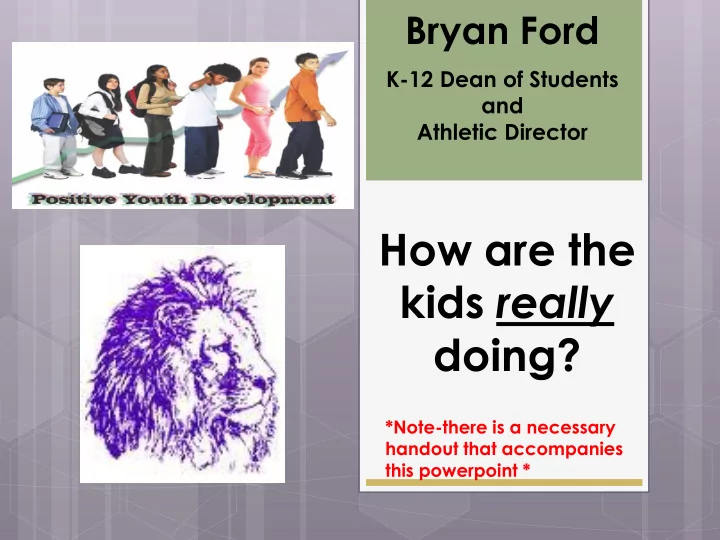

Bryan Ford K-12 Dean of Students and Athletic Director How are the kids really doing? *Note-there is a necessary handout that accompanies this powerpoint *
Today’s Targets After this presentation, I want you to be able to: Explain the 40 Developmental Assets in a nutshell Identify strengths and weaknesses in the youth of our community Walk away with a few things you can do right away to help your children and the community’s children
Youth Development at Dryden Dryden’s Mission: “Promoting academic achievement and youth development” 40 Developmental Assets model Asset: positive experience/skill/ relationship/opportunity that a youth has as a building block to success A common language/philosophy Research-based and whole- community focused
Shifts in Thinking Children are not problems to be fixed, but fires to be lit Less programming-focus, more relationship-building It is everyone’s work, not just those who directly work with kids Children are resources, not just absorbers of them
Seek First to Understand… Extensive surveying to understand our students’ strengths, weaknesses, etc. 40 Developmental Assets survey 4 th , 7 th , 11 th each year National norms to compare to Communities that Care (CTC) survey 7-12 every other year County norms to compare to (a few national) Data analysis Key difference — problem-oriented vs. solution-oriented
CTC Findings Prior 30 Day Usage Rates, 7-12 graders: 2012 2014 2016 Dryden County Dryden County Dryden County Alcohol 16.2% 18.2% 14.5% 19.2% 15.5% 13.7% Cigarettes 6.3% 5.8% 5.1% 4.7% 3.9% 2.9% Smokeless 6.2% 4.5% 5.4% 3.8% 3.2% 2.1% Tobacco Marijuana 9.5% 13.8% 9.1% 14.7% 11.0% 10.7%
CTC Findings % of students having used by graduation Dryden County Have smoked cigarette 22.8% 19.4% Have drank alcohol 70.7% 66.5% Have smoked 43.3% 42.1% marijuana Have misused 14.3% 11.7% prescription drugs
CTC Findings
CTC Findings
CTC Findings More females use than males…until senior year
CTC Findings Dryden Average Age of First Usage: Cigarettes 13.1 Marijuana 14.3 Alcohol 14.7
Solution-oriented Thinking 40 Developmental Assets is about giving youth the building blocks to succeed Research shows a direct correlation…more assets equals less risky behaviors and better outcomes
What are some of Dryden’s strengths?
What are our strengths? 77% Asset: Family Support *Ahead of national average*
What are our strengths? Asset: Expectations 69% High *Ahead of national average*
What are our strengths? Positive Values Assets: 82% -Honesty 82% -Integrity -Responsibility 76% *All ahead of national average*
What are our strengths? 78% Asset: Positive Peer Influence *Ahead of national average*
What are our strengths? 57% Asset: Service to Others *Ahead of national average*
What are some of Dryden’s weaknesses?
What are our weaknesses? Asset: Self Esteem 38% *Well below national average*
What are our weaknesses? Empowerment Assets: 28% -Community Values Youth 36% -Youth as Resources *Around national average*
What are our weaknesses? 19% Asset: Reading for Pleasure *Below national average*
What are our weaknesses? 30% Asset: Religious Community *Well below national average*
What are our weaknesses? 14% Asset: Creative Activities *Around national average*
Do the boys and girls data differ?
Do our girls’ and boys’ data differ? Boys trail girls in the following: Reading for pleasure by 19% Homework by 19% Interpersonal competence by 18%
Do our girls’ and boys’ data differ? Girls trail boys in the following: Positive view of their future by 22% Safety by 25% Sense of purpose by 21% Self-esteem by 30% *CRISIS*
Do our students in poverty differ? Note: About 50% of Dryden students are coming from poverty backgrounds Five fewer assets on average Biggest gap assets: Achievement motivation Self-esteem Adult role models Community values youth
Other interesting/standout data 20% more than national avg. Home alone Juniors having sex 41% had…10pts more than national avg. Riding with impaired 18% did in the last year driver Juniors on marijuana 53% find it a risky behavior Physical abuse at Just over 20% home
Other interesting/standout data Trauma: 32.9% report family member having severe alcohol/drug problem Transiency: 16.9% changed homes in the last year 20.2% have moved 5+ times Family Discipline: 12pts below avg. on 100pt scale Family: 54% live with both biological parents (62% is national average)
Mental Health Dryden County Life is not worth it 27.4% 24.7% I think I’m no good at all 36.0% 34.5% I’m a failure 23.9% 21.6% I’m sad or depressed most 33.8% 30.7% days
Connection to Neighbors Dryden County Ad adk Neighbors notice me doing a 24.3% 25.5% good job 39.3% 43.3% Has a neighbor they could talk with about something important Neighbors are proud of me 40.4% 43.2% when I do well Neighbors encourage me to 45.5% 52.0% do my best I don’t feel safe in my 22.1% 14.4% neighborhood
Connection to Mom and Dad Dad Mom Ad adk Dryden County Dryden County I’m not close with my… 26.7% 27.2% 21.2% 15.4% I don’t share my thoughts 44.6% 41.7% 36.6% 29.4% and feelings with my…
Areas of School District improvement: 2012 2014 2016* Feels welcomed and appreciated by 31.4% 33.3% 39.7% school adults Has a trusted adult in school who can help 44.1% 45.0% 51.7% with problems Feel school rules are fairly enforced 25.9% 26.5% 32.3% *While these numbers are low, we are not far off the County average and are showing real growth with our Youth Development work Note: We also are above the national average for the “Caring School Climate” asset
Today’s challenge What “arrested” you today? Give the youth of Dryden a “high five” …and don’t leave them hanging !
Recommend
More recommend